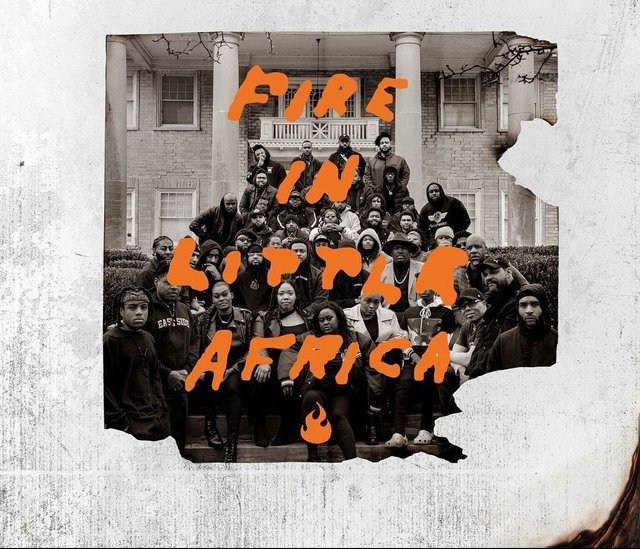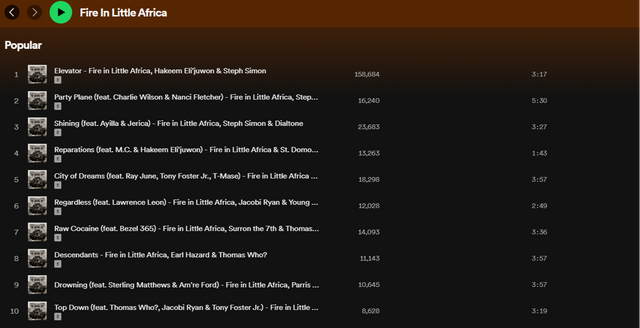FIRE IN LITTLE AFRICA: THE ALBUM THAT DIDN’T LIVE UP TO IT’S POTENTIAL

I had a dream,
It was May 29th
I was sittin in a cell
Devil playin with my life
A year later, after the May 27th release of one of the most anticipated albums to come out of Oklahoma. At arguably the time when the most eyes were on a city that was still devastated and plagued by the social unbalances. Fire In Little Africa (also known shorthand as FILA) set out to be the fruits to the labor of the seeds that had been sewn far earlier than the artists that worked together to bring Fire In Little Africa to life. This was to be the descendants get back, as rapped on the track 4 by artist Earl Hazard, “This is how revenge seeds react.” But was the reaction enough to get the whole town behind them? What about the whole state? What about the whole world? I think the answer is no!.
Tulsa has always been a divisive city. There’s groups inside of groups, inside of clicks, inside of friends, inside of families. You get the jest of it. To be well received by the city you must be apart of something. But what about when you take so many artists from the same city and sprinkle in artists even from the state? You would think there would be enough cross-sections and intersections in social circles that everyone should’ve been bumping Fire In Little Africa. But it wasn’t. Throughout the year there were so many people who said they never heard of the project. They haven’t even heard of the artists. But either someone’s lying. Or the truth is something no one wants to talk about. That being. Tulsa doesn’t support Tulsa. In the words of Lil Flip. “You can ask David Banner”. His performance at the Legacy Festival proved that Tulsa don’t like Tulsa.
“Either they don't know,
don't show,
or don't care about what's going on in the hood.”.
But how can people not know about Fire In Little Africa? They literally were signed to Motown. One of the most prestigious record labels. They put out the Jackson 5 for God’s sake. FILA also had Beyoncé's publist Yvette Noel-Schure to help promote the album. I don’t think you just understood what I just wrote. Beyoncé's publicist was FILA’s publicist. Formation’s publicist was FILA’s publicist. Lemonade’s publicist was FILA’s publicist. The artist who can be referenced as just “B.” was FILA’s publicist. Do I need to say more? And I would say that she did her job. Throughout all last year some of the most well respected publications in the music industry featured FILA artists. From Complex, to Rolling Stone, djbooth, to Billboard. There were articles sprinkled throughout the internet. But what about the Tulsa? Did Tulsa know? My question is. How couldn’t have Tulsa known? The Root Tulsa, TulsaPeople, KTUL News Channel 8, The Oklahoman, The Black Wall Street Times, and the Tulsa Wolrd are just a few of the local publications and news outlets that have featured the Fire In Little Africa project. There was even a time where the Fire In Little Africa project was featured in the New Releases section of both Apple Music and TIDAL. So how couldn’t you know. So like in the words of Doughboy, “Either they don't know, don't show, or don't care about what's going on in the hood.”.
With all this press. All this industry and this machine behind them. Why is this not the hugest album in Oklahoma history and beyond? Where’s the world tour? Where’s the rows of Bentleys and spin-off individual projects just like in the Wu-Tang Hulu series? The rap game's level of sucess is the money, chains, weed, girls, fly cars and big mansions. That hasn't happened yet. That’s because everything that’s gold, doesn’t always glitter. But this isn’t the first time that a classic album wasn’t given it’s just due. Jay-Z’s first album Reasonable Doubt wasn’t well received by the critics when it first dropped. I have to think though that there has to be some invisible strings being pulled. Because if a rapper from Fayetteville, North Carolina can find his own lane in the rap game, than surely a collective of artists from Tulsa, Oklahoma can do the same. But how did he introduce his group to the world?
"Grandma home remedy turned into a business
I can pass on when I pass on this soliloquy"
J. Cole’s “Revenge” documentary set the hip-hop world on fire. You literally got to see artists introduce themselves to the world and own their moment right before your eyes. One standout was Buddy. An artist from Compton that stole the show and didn’t wait to be invited into a recording session. He just jumped in any and every session he could. I know. I’ve went on about the documentary. It’s a set up. Fire In Little Africa took this same approach when creating the album. They created a documentary that captured the feeling of what it was like to be in those recording sessions. And at the very height of Covid. A Pandemic. The Lockdown. These all happened during the recordings of Fire In Little Africa. And all these artists have done what they’ve been doing their whole careers. Risk it all for a chance. For an opportunity. They risked their master's for the opportunity to be famous and to show that North Tulsa Got Something To Say.
Fire In Little Africa dove into every imaginable medium. From music with the release of the project on streaming as well as on vinyl. Included in this is a podcast and radio that interviewed the artists and the behind-the-scenes people of the Fire In Little Africa project. There was also fashion. The Fire In Little Africa essentially had seasons of fashionable wear that were quality and marketed as urban wear. Also there was art and photography. Paintings and art shows curated by Fire In Little Africa front man and No Parking Studios CEO Dialtone captured the moments on every canvas. There was education. A curriculum created to teach the next generation what Black Wall Street was and in between the pages, a blueprint to create the next one. Last but not least was uncle Charlie. Charlie Wilson was a major marketing tool that caught the eyes and ears of people who recognized a familiar voice. A Tulsa voice.
So why isn’t Fire In Little Africa soaring to the measures of the bar that was set so high? I don’t know if we can fully answer that question. As much as we like to think that streaming has killed the gatekeepers. There’s someone obviously not letting Oklahoma artists in. With the expectation being Gang51E June who has seen his popularity grow in the Pandemic. The artists. That’s the real people affected. The people who gambled so much. This was their big break. I think there lies the problem. Some of the artists took a break. They saw being signed as a label as a reason to slow up on dropping music. When in fact it should have been the reason to push their foot on the pedal and drop more music than ever before. Something that the algorithms could latch onto and continually play. This was the time to get their business straight. That means their merch. Their website. Their social media should be a tool, an advertisement, not a place to rant. A place to offer a product which is their music. FILA was really a time to be a student. That means going to the label and seeing how the marketing department works. Or when your on video sets asking the cameraman about how the do certain shots. It was a time to network with other artists on the label and see how they navigated the game.
Not all the artists took a break. There were a few artists that put their foot on the pedal and consistently dropped music or saw this as an opportunity to promote their brand and pivot. I even saw some videographers step up their game and it was because they were soaking up game on all those video shoots. But not dropping music because you’re an artist and you drop when you want to is the wrong idea when so many eyes are on your brand. Because in the end either you do this. Or you do this.
"Men lie, women lie, numbers don’t."
Are the numbers in FILA’s favors? Oklahoma is a well-known country, jazz, and funk. So how does hip-hop stack up when looking at music in Oklahoma? A quick Google search revealed that the most popular music genre in Oklahoma is… Metal?? (According to WideOpenCountry.com). And according to Grizzlyrose the most famous contemporary artist in Oklahoma is Drake. DRAAAAKKKEEEEE??? There are so many different versions of what the truth is. Looking at the numbers on Spotify (Warning! This is not an official number). The streams should have been astronomical. The reach of the publications stated earlier and the press run that FILA went on. The numbers just don’t add up.

The silver lining is that streaming is that it has the potential to break a record at any time. FILA could be one TikTok or reshare from blowing up. But for now it hasn’t lived up to it’s potential. This is no slight to the artists or the music. The music is all there. The project is historical. It’s a piece of art. But like art. Sometimes it takes time for someone to wipe off the dust and see the beauty in it. Until then, I just hope that the artists keep working. Keep making music. Keep pushing their brand. FILA shouldn’t be the pinnacle of their career. It should be a resume footnote and a negotiating leverage when they do go into see these major labels. They should be able to take all the knowledge they learned from working with a major label and apply it to their future projects. Until then I’ll keep banging Fire In Little Africa. And to tell the homies to KEEP ON SHININ'.
Make sure you go stream the album below:
https://open.spotify.com/album/0YgL2AjouKxA69MXpVj1Np
Thanks for reading! Make sure you like, comment, and share!
For more content go to www.tulsalines.com